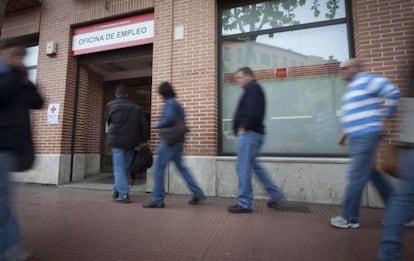One in five Spanish job seekers has not worked in three years
Long-term unemployment rose 22% last year, to 1.275 million Experts warn problem will be lasting legacy of the economic crisis


Six years into a profound jobs crisis, and the full effects of long-term unemployment are beginning to emerge. Figures from the latest Active Population Survey show that 60% of Spain’s 6 million unemployed have not worked in a year. What’s worse is that among this group, the proportion of people who have been without work for three years or more is growing, and now stands at one out of every five job seekers, according to data published on Friday by the National Statistics Institute (INE).
The Active Population Survey shows that last year there was an average of 1,275,700 job seekers who, having been active previously, had been unable to return to the job market in at least three years. This represents a rise in long-term unemployment of 234,200 people compared with 2012, an increase of 22%.
Admittedly, the pace of the increase has fallen off in the last two years, when long-term unemployment was rising at a rate of 40% a year. But it remains way above the general unemployment rate, which has begun to fall in the last two quarters, as a result of the marked decline in the active population. In 2007 the proportion of people who had gone three years without working was just 13% of all job seekers, while in 2013 that figure reached 21%.
Studies underline that someone’s chances of finding a job decrease in line with the time they spend out of work
Experts say that long-term unemployment will be the worst legacy of the crisis, and the most difficult to tackle. Those who have gone more than three years without finding work no longer have the right to unemployment benefit and, in most cases, job-seeking-related subsidies. The debts of those weathering the crisis with no – or only an unsteady – income are growing. This is the main problem, but so is the increasing difficulty of getting these people back to work: a number of studies have underlined that the probability of finding work decreases abruptly in line with the number of years a person spends out of the labor market.
The survey also backs up another finding of the job market studies: the better someone’s education, the greater their chances of getting work. Two-thirds of Spain’s 38.6 million residents who are over 16 have an educational level equivalent to, at most, high-school diploma level. Out of this large group with only a basic education, barely half are active in the labor market, with high unemployment levels of 33%.
At the opposite end of the spectrum, the higher someone’s qualifications, the greater their chances of finding a job, above all in the case of those who have studied life sciences (biochemistry, biosanitation, biology), computer sciences and mathematics, where employment rates are 75%. Those with mathematics and statistics qualifications also have the lowest unemployment rate, barely 7%.
Tu suscripción se está usando en otro dispositivo
¿Quieres añadir otro usuario a tu suscripción?
Si continúas leyendo en este dispositivo, no se podrá leer en el otro.
FlechaTu suscripción se está usando en otro dispositivo y solo puedes acceder a EL PAÍS desde un dispositivo a la vez.
Si quieres compartir tu cuenta, cambia tu suscripción a la modalidad Premium, así podrás añadir otro usuario. Cada uno accederá con su propia cuenta de email, lo que os permitirá personalizar vuestra experiencia en EL PAÍS.
¿Tienes una suscripción de empresa? Accede aquí para contratar más cuentas.
En el caso de no saber quién está usando tu cuenta, te recomendamos cambiar tu contraseña aquí.
Si decides continuar compartiendo tu cuenta, este mensaje se mostrará en tu dispositivo y en el de la otra persona que está usando tu cuenta de forma indefinida, afectando a tu experiencia de lectura. Puedes consultar aquí los términos y condiciones de la suscripción digital.








































